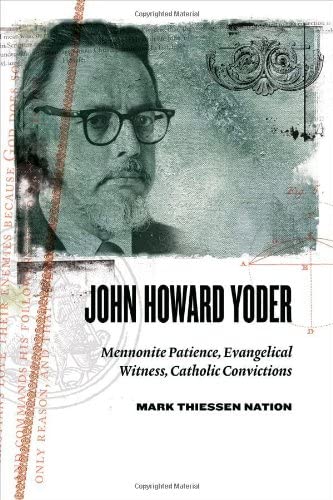Deliver to Greece
IFor best experience Get the App


John Howard Yoder: Mennonite Patience, Evangelical Witness, Catholic Convictions
K**S
Ecumenical, evangelical, catholic
John Howard Yoder, whom author Mark Thiessen Nation believes (correctly, in my estimation) to have offered "the most powerful articulation of a Christian theological rationale for pacifism that has ever been given," (p. 193), is sometimes dismissed by nonpacifist Christians as a theologian who speaks from a narrowly Mennonite perspective. Since he's not denominationally mainstream, these critics continue, neither is his defense of nonviolence. It's a Mennonite thing, if you will, the hobbyhorse of a traditional "peace church."Nation's book has the very real merit of responding to such critics. He effectively argues that although Yoder was a loyal Mennonite his entire life and highly influenced by the Anabaptist tradition, he always intended his message to be ecumenically and evangelically addressed to all Christians and considered it to be catholic--that is, cross-denominational. After providing a quick biographical overview, Nation explores this reading of Yoder in a series of chapters that explore Yoder's call for "ecumenical patience," an "evangelical and catholic peace theology," and a social responsibility inspired by and squarely focused on the offense of the Cross.This is a good, solid read of Yoder, who at least sometimes is a rather difficult, wordy (perhaps from all his years reading Barth!) author. But Nation's book, despite its exciting subject, is strangely lackluster. It relies a good deal on a staccato style that ticks off bullet points instead of offering sustained discussion, and often comes across as a rehashed but still dry doctoral dissertation (which I doubt it actually is). I found the ideas in the book interesting (although, in all honesty, somewhat obvious for readers with some familiarity with Yoder), but the book itself a bit of a chore to read. What's absolutely indisputable, though, is that Nation knows his Yoder. The documentation is impressive and really quite helpful.Better treatments of Yoder, I think, are Craig Carter's The Politics of the Cross: The Theology and Social Ethics of John Howard Yoder (2001) and the essays collected in Stanley Hauerwas' and Chris & Harry Huebner's excellent The Wisdom of the Cross: Essays in Honor of John Howard Yoder (2005). In the latter volume, Nation kicks off the festschrift with a biographical essay that basically summarizes his thesis that Yoder's thought is Mennonite, ecumenical, evangelical, and catholic.
J**R
Introducing JHY and his ecumenical approach
A serviceable introduction to the work of quietly influential and widely under-read theologian John Howard Yoder, writer of the Politics of Jesus and a host of other work. Nation focuses primarily on Yoder's ecumenical work, both practically over a decade of conciliar work and teaching at Notre Dame, and theoretically in his exploration of an Anabaptist-based hermeneutic that was really for all Christians. Nation traces Yoder's roots in the Mennonite church and Anabaptist thought, but also rightly emphasizes that Yoder was never writing simply for a Mennonite audience. Nation's chapters summarizing Yoder's historical work, the Royal Priesthood, and The Politics of Jesus are especially strong. Recommended for anyone who wants a quick summary of Yoder's thought - and especially as a gateway introduction into Yoder's brilliant, revolutionary theological work. Anything that gets Christians reading JHY is worthwhile in my eyes.
A**R
Nation Is Knowledgeable Yet Slightly Dry
John Howard Yoder has contributed so much to the understanding of how Jesus offers the Christian community a social ethic that one would be at a loss if they did not read Mark Nation's overview of the life and writings of Yoder. Mark Nation is thoroughly acquainted with all of the writings and contributions of Yoder. He weaves together a good book through his knowledge of Yoder's ideas.The best part of the book, I thought, was Chapter 4 entitled, "The Politics of Jesus, the Politics of John Howard Yoder: An Evangelical and Catholic Peach Theology". This chapter gives a great background sketch as to why "The Politics of Jesus" was written (it was to be an ecumenical book), has a great summary of the book, and gives some great insight as to how and why Yoder organized some of his arguments in the book.On the negative side of things, the book is, to say the least dry and cumbersome at times and not that exciting of a read (which could also be the case with reading Yoder). But Nation's knowledge of Yoder makes up for the dullness of the book.If you are looking for a book that covers Yoder's background, his ideas, his methodology of interpretation, and highlights of his most significant contributions, this book will be a helpful read.
Trustpilot
2 weeks ago
5 days ago